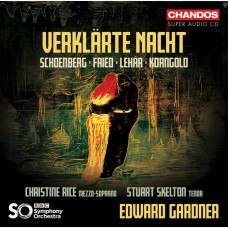|
荀伯格: 昇華之夜, 弗里德: 昇華之夜, 康果爾德: 告別之歌
愛德華.加德納 指揮
BBC交響樂團
Hot on the heels of their acclaimed recording of Britten's Peter Grimes, Stuart Skelton and Edward Gardner join forces with Christine Rice and the BBC Symphony Orchestra for this fascinating programme of early twentieth-century works. Schoenberg's Verklarte Nacht needs no introduction, but far rarer is Oscar Fried's contemporaneous setting of the same poem. Composed in 1901 for soloists and orchestra, Fried's version is a true setting of (as opposed to Schoenberg's reflection on) the text by Richard Dehmel. Lehar wrote Fieber in 1915 as the closing part of his song cycle Aus eiserner Zeit – he then made the orchestral setting a year later. Korngold's Lieder des Abschieds (Songs of Farewell) date from the early 1920s, whilst he was still in Vienna, and shortly after he had completed the opera Die tote Stadt. Setting poetry by Christina Rossetti, Edith Ronsperger, and Ernst Lothar, the cycle is a poignant reflection on the Great War.
FRANZ LEHAR
1. Fieber (1915) * 12:29
(Fever)
Tonduchtung für Tenor und groBes Orchester
(Tone Pooem for Tenor and Large Orchestra)
No.5 from Aus eiserner Zeit, Song Cycle for Voice and Piano,
Orchestrated 1916 by the Composer
OSKAR FRIED
2. Verklarte Nacht, Op.9 (1901) *† 8:22
(Transfigured Night)
for Mezzo-soprano, Tenor and Orchestra
Ruhiges ZeitmaB - Sehr ruhig - Breit - Sehr breit -
ARNOLD SCHOENBERG
Verklarte Nacht, Op.4 (1917, revised 1943) 28:43
after Richard Dehmel
Arrangement for String Orchestra by the Composer
of Version for Two Violins, Two Violas, and Two Cellos (1899)
3. Grave - Poco piu mosso - 2:43
4. Moderato - Calando -1:01
5.A tempo [Poco piu mosso] - Poco piu mosso - Animato - Poco adagio - 5:01
6. Poco allegro - Pesante - Grave -4:06
7. Pesante - Grave -1:56
8. Adagio - Meno mosso - Piu mosso, moderato - Poco piu mosso - 6:03
9. Poco adagio - Calando -3:37
10. Adagio (molto tranquillo) - Largo - Calando - Adagio 4:13
ERICH WOLFGANG KORNGOLD
Lieder des Abschieds, Op.14 (1920-21) *13:36
(Songs fo Farewell)
for Tenor and Orchestra
Franz Schalk gewidmet
11. Sterbelied. Sehr ruhig und gefaBt; mit verhaltener tiefer Empfindung - 3:37
Mit Steigerung - Wieder steigernd - Nachlassend -
12. Dies eine kann mein Sehnen nimmer fassen. Mit leidenschaftlichem 2:17
Schmerz, maBig schnell, erregt im Ausdruck - Erregt - Breit -
13. Mond, so gehst du wieder auf. Mit groBter, schmerzlichster Ruhe, 4:07
ganz langsam, stets auBerst gebunden, ausdrucksvoll - Steigerne -
14. GefaBter Abschied. Mit liebenswürdigem, heiter-gemütvollem 3:33
Ausdruck - Etwas bewegter - Ein wenig steigernd (im Ausdruck und ZeitmaB) -
Total time: 63:05
Christine Rice mezzo-soprano *
Stuart Skelton tenor *
BBC Symphony Orchestra
Igor Yuzefovich leader
Edward Gardner |
|



